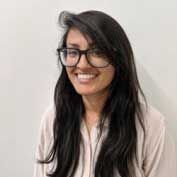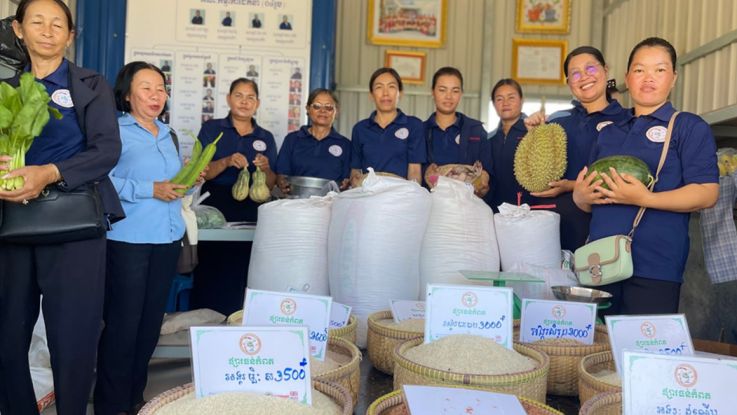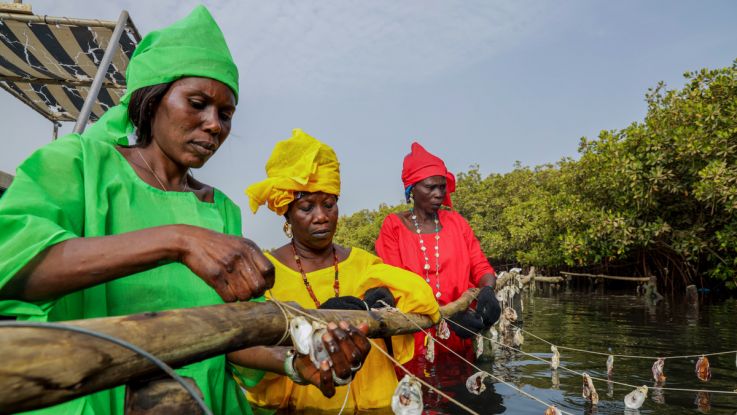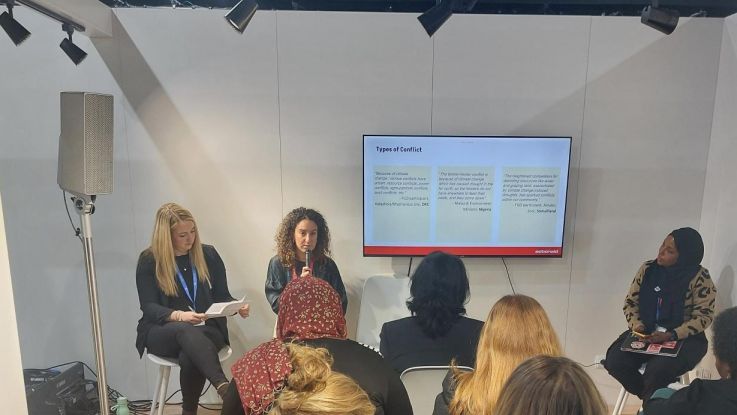What can we do about climate change?
2 June 2023
This World Environment Day, we spoke to ActionAid’s Head of Policy and Research for Climate, Sophie Rigg, about climate change and climate justice.
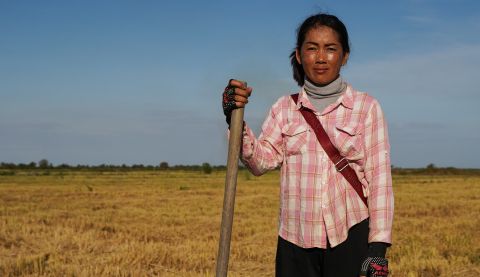
Hok is a women's leader in Cambodia, helping her community become more resilient to climate change. Photo: Cindy Liu/ActionAid
Climate change is a global crisis that affects us all, but its impact is not distributed equally - it affects women and girls the most.
The gendered impact of climate change underscores the urgency to address the unique challenges faced by women and girls. By understanding their vulnerabilities, supporting their leadership, and incorporating their perspectives, we can collectively forge a path towards a sustainable future that leaves no one behind.
We asked Sophie Rigg, ActionAid’s Head of Policy and Research for Climate, what a world with unmitigated climate change will look like in a few decades; what can an individual do when the whole debate around climate change feels complex and overwhelming; and who’s responsible for slowing the clock on climate change.
Q. Sophie, what should our priorities be to slow global warming, and what will the world look like if we don't?
Two key drivers of global warming are fossil fuels and industrial agriculture. Industrial agriculture is less focused on, but has huge carbon emissions and very much contributes to global warming which leads to climate change.
Stopping fossil fuel extraction, and preventing any further extraction of fossil fuels is absolutely key, as well as addressing the huge amounts of emissions that come from industrial agriculture. And these two are key priorities for ActionAid where we really need to see lots of action and change in the immediate future.
And if there aren't urgent actions on these fronts and in other key areas of climate change, we're going to be seeing an increasingly uninhabitable planet with more droughts, increased wildfires and climate-induced crises. And we are going to see a rise in humanitarian crises globally. We're also likely going to see increased inequality, as the battle for dwindling natural resources, becomes more acute.
Q. Why does climate change affect women and girls differently than men?
Climate change disproportionately affects women and girls because it heightens inequalities that women and girls already face.
Women and girls are more likely to live in poverty than men and have less capital and own less land than men. They also face more discrimination that can worsen during and after climate disasters such as floods and droughts and can push them further into poverty.
Our research has also shown how women and girls are at greater risk of violence during periods of climate stress as they have to go further to collect water and into areas where they are less protected. They are also more likely to have to drop out of school and face early marriage to help support their family in times of stress.
This is why ActionAid works closely with women and girls to build sustainable, climate-proof livelihoods and strengthen their resilience against future crises.
Q. What’s the critical role women play in responding to climate change?
Women understand the specific gendered challenges that they face – they know how to design the solutions to climate change.
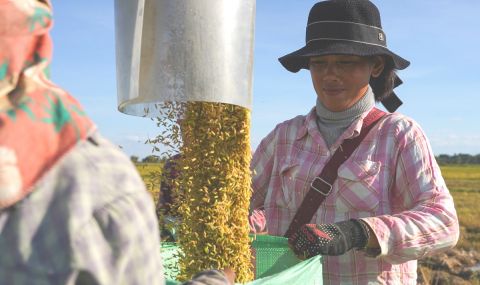
Hok training women in sustainable farming .
Women and girls are the backbone of many communities across the world and are well placed to build their community’s resilience to climate change. Take for example, in Cambodia, we have leaders like Hok, who teaches other women farmers how to adapt to climate change.
Hok works tirelessly to share information with other women about what seeds to use and how to save water during droughts. She also represents the voices of her community at climate meetings with local government. Hok is a really good example of how women are demonstrating leadership in the face of the climate crisis the world over.
Q. With so many complex and urgent issues competing for our attention, what can one person do? Where should they even start?
There’s a lot that one person can do and we must not lose sight of how much agency we have as individuals and how much we can collectively do together.
You can join campaigns and help to hold polluting businesses and corporations to account. You can call for a change in their practices and you can vote with your feet and with your wallet on where you shop and who you bank with.
You can also advocate to your local MP and demand more from our government and push for greater action on climate change from the government.
So, I think there's a lot that one person can do, and that we still have the ability collectively to make a huge difference in our future.
Q. If this decade is our last best chance to avert the worst consequences of climate change, what should world leaders do?
We need to see political leadership from our world leaders. We need to see less talk, and nice words and much more action. We need to see the implementation of promises that have been made long ago and that still have not been kept. The $100 billion is a key example of that. $100 billion a year by 2020 was promised by countries that have historically polluted the most to help countries on the frontlines of the climate crisis adapt.
But three years on we are still waiting for this promise to be kept. There is urgent need for financial support – but this is also about integrity and trust. We really need to see much greater political leadership on the climate crisis by world leaders.
We also need to see progress on the loss and damage agenda. At COP27, it was agreed that a loss and damage fund should be set up and it's important that we see agreement on how the fund will work this year at COP28; we also need to see political commitments to put significant financial resources into the fund.
Q. What is loss and damage?
Losses and damages are the impacts of climate change. These can be economic like lost houses, jobs or revenue, or losses in agricultural output by increased drought or flooding. But they can also be less tangible and what we call non-economic losses and damages. This is the loss of ways of life, and a loss of culture. So, we need to look at the full spectrum of losses and damages. This conversation on loss and damage at its heart is about climate justice. It is the countries that have historically polluted the most, that must pay to address losses and damages. The countries, communities and people on the frontlines of climate impacts such as droughts, floods and cyclones need urgent support to rebuild and adapt to increasing climate change and the risk that it brings.
When addressing loss and damage we also need to make sure that women's rights are properly considered. There is a cyclical downward spiral between climate impacts and women’s rights and it is imperative that women’s specific needs are met and that they are involved in addressing the impacts of climate change and building resilience. World leaders also need to recognise the importance of women's rights and make sure they are at the centre of climate justice and climate policies.
Q. What can the UK government do to achieve climate justice?
The UK government needs to be a leader on climate change and climate action. And they need to really put climate justice and women's rights at the centre of their climate work. This is in terms of their programs globally but also in terms of their influencing power in key decision-making circles such as within the UN, the G7, and of course, at the COPs.
Q. Who is responsible for tackling climate change?
In terms of who is responsible, the countries that have historically polluted the most, including the UK, have a particular responsibility to mitigate climate change, to support the world to adapt and to address losses and damages. These countries have benefited from industrialisation and profited from fossil fuel extraction and the world has is now paying the price. So, these countries have a responsibility to help set that right and to drive forward a just transition to a greener and fairer world.
Read more about ActionAid's work on climate justice.
